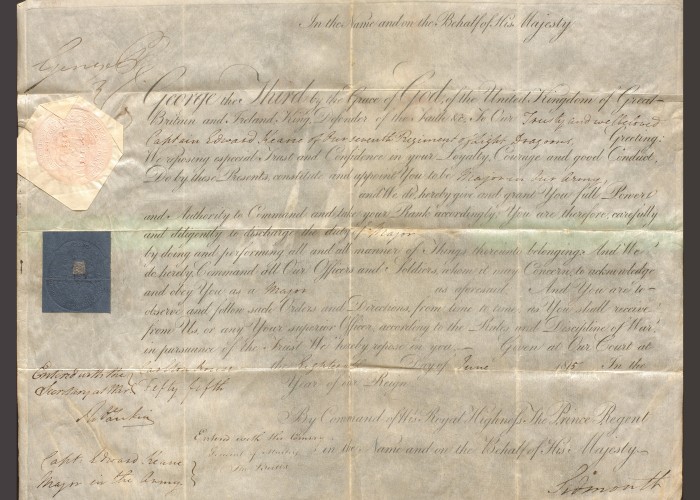Officer’s Commission
This is an officer’s commission awarded to recognise the bravery of a British officer at the Battle of Waterloo. A commission is a formal document stating the rank of an officer in an army. Edward Keane of the 7th Light Dragoons (Hussars) was awarded the brevet rank of Major for his service at Waterloo, and this commission is back-dated to 18 June 1815, the date of the battle.
In 1815, the officers of European armies were described as commissioned, to distinguish them from the non-commissioned officers (sergeants). Whereas sergeants were appointed within the regiment, officers received their commissions from the king, as this document illustrates.
Most commissions were purchased, although there were several other ways by which a man might receive a commission. For example, he might be promoted from the ranks, serve as a volunteer, or complete a course of study at the Royal Military College. Except where promotion came about because a senior officer had died on active service, a man promoted to a higher rank would pay the difference between his old and new rank, in this case £1,000. The actual value of a cavalry majority was £4,250. Upon retirement the man could sell his commission.
This commission is interesting not only because it is, coincidentally, dated the day of the Battle of Waterloo, where Edward Keane was fighting with the 7th Light Dragoons (Hussars), but also because it is for brevet rank. Brevet rank was a reward for bravery or good conduct, but it carried neither extra authority or extra pay. This is indicated by words: “in his army”, rather than appointment in a specified regiment.
Brevet rank was open to captains, majors and lieutenant colonels, but it was an army rank rather than a regimental rank. Keane would continue to function as a company captain with the 7th Hussars, rather than as a field officer. On non-regimental duty, however, he could take precedence over majors whose commissions post-dated his brevet appointment.
Brevet rank did not affect pay or promotion within the regiment. Keane, for instance, did not obtain the majority which became vacant as a result of the death of Major Hodge on the 17th June at Genappe. Nor did his position in the list of captains change. Brevet rank might draw attention to a man, however, in situations where the Commander-in-Chief (the Duke of York) could bestow patronage.
Edward Keane finally achieved his regimental majority several years later, in December 1819.
-
Curatorial info
- Originating Museum: National Army Museum
- Accession Number: 1977-08-17
- Production Date: 1815
- Material: Paper, ink
-
Use this image
- Rights Holder: Copyright National Army Museum.
- License Type: All Rights Reserved
Find it here
This object is in the collection of National Army Museum






